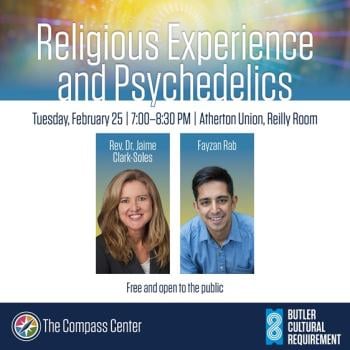Editors' Note: This article is part of the Patheos Public Square on the Future of Faith in America: Evangelicalism. Read other perspectives here.
Among the most frequently cited trends documented in "America's Changing Religious Landscape" is the continuing rise of "Nones." Increasing numbers of Americans are religiously "unaffiliated." In the context of this Pew study, this category includes Atheists, Agnostics, and those described as "Nothing in particular" with regard to religion. And, within this category, the percentage increase for "Nothing in particular" is more than the percentage increases for Atheists and Agnostics combined. Indeed, according to the Pew study, the "Nothing in particular" sub-group saw the largest percentage increase from 2007 to 2014 of any sub-group in the report.
My look here toward the future of evangelicals in America takes the form of curiosity (with genuine interest), rather than a prediction. There are many locations on the Pew-described "landscape" that I will watch in the coming years. One of these is the relationship (or lack thereof) over time between the continuing advance of the "Nones" and a distinctive sub-stream of American Evangelicalism.
Evangelical Protestant Christianity is itself home to a form of "Nones." Many evangelical Christians and evangelical churches celebrate the fact that they are not associated with any particular tradition or ecclesiastical denomination. They claim to pursue "just plain Christianity." In a manner that is, quite simply, inconceivable within (Eastern) Orthodoxy, (Roman) Catholicism, and most of "Mainline" Protestantism, many American evangelicals and evangelical churches hold a rather romantic notion of "just plain Christianity" which is unencumbered by institutions, theological "systems," and other "man-made" strictures. (I confess that I am not well enough informed about the important category of "Historically Black Churches" to propose a comparison.)
And here is the interesting similarity, at least on the surface. While along with most other streams of Christianity in the Pew report, "Evangelical Protestant churches" saw a decline in percentage of the U.S. population, the "Nondenominational" sub-group was one of only three sub-groups within Evangelicalism (the others being Pentecostal and Adventist) that saw an increased percentage. And, of these three, the gains by "Nondenominational" churches were far and away the largest (from 3.4 percent in 2007 to 4.9 percent in 2014).
What catches my attention here as we ponder the future is not this slightly upward trend in "Nondenominational" evangelical churches in itself. Rather, it will be worth watching to see whether or not trends in the coming years reveal values or sensibilities which are common to both the rise of "Nones" and the strength, at least relatively speaking within Christianity, of nondenominational evangelical Christianity. Might it be that an increase in "Nones" will be in some sense paralleled by a continuing increase, even if not as large, of nondenominational evangelical Christianity? Might nondenominationalism be especially well-suited for a time and culture such as this, a time when there is an increase in "Nones"?
What would prompt me to wonder about a comparison of the futures of "Nones" and nondenominational evangelicals? I will approach this from the point of reference with which I am more familiar: "independent" and nondenominational American evangelicals. Risking incompleteness and lack of nuance due to necessary brevity here, I will suggest some characteristics and characteristic tendencies among nondenominational evangelicals. As will be evident, these are not discrete components but overlapping and interwoven dimensions.
First, there is a high priority placed on immediacy — immediacy in relation to God. Nothing (for example, a church) and no one (for example, a priest or clergyperson) should "come between" an individual and God. Christianity consists in a direct personal relationship, one-to-one, with God.
Second, there is a measure of anti-institutionalism. In some respects, this is an elaboration on the previous point. And, anti-institutionalism is clearly implicit in the identifier "nondenominational," which is not simply an externally-imposed label but for many is a proud self-descriptor. In some cases this is a matter of temperament or social dynamics while in other cases it is very much biblically and theologically driven. "Man-made" institutions, including the churches, are viewed at best as hindering and at worst as undermining God's dynamic working.




